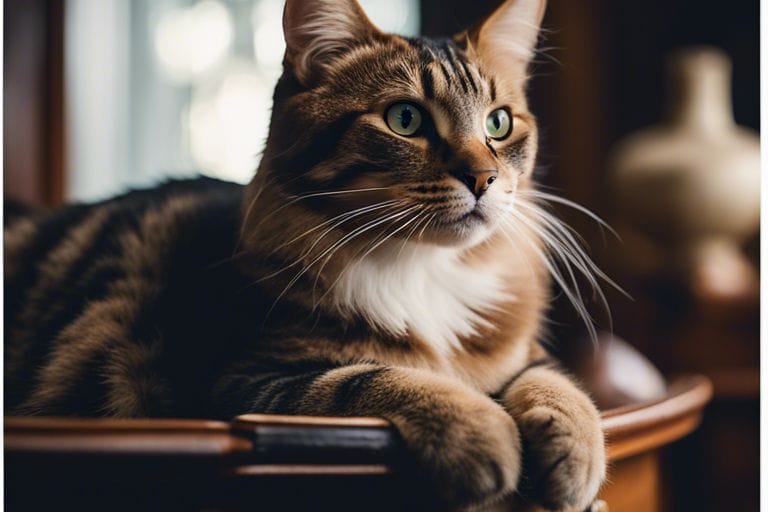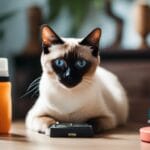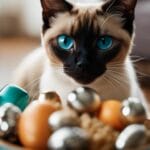Ultimate Guide to Maine Coon Cats
You have stumbled upon the ultimate guide to Maine Coon cats, exploring their fascinating history, distinctive traits, and valuable tips to care for these majestic felines. From their origins as skilled mousers on ships to their friendly and playful personalities, Maine Coons are a beloved breed with unique characteristics. Ultimate Guide to Maine Coon Cats. Whether you are a proud Maine Coon owner or considering adding one to your family, this comprehensive guide will provide you with everything you need to know about these wonderful cats.

History of Maine Coon Cats
Origins and Early Development
You may be wondering about the origins of these majestic felines. Ultimate Guide to Maine Coon Cats. Maine Coon cats are believed to have originated in North America, specifically in the state of Maine. It is said that the breed was developed through natural selection in the harsh climate of the region, resulting in their distinctive characteristics such as a dense water-repellent coat, tufted ears, and bushy tails.
The Rise to Popularity
There’s a fascinating story behind the rise of Maine Coon cats to popularity. Ultimate Guide to Maine Coon Cats. These cats were highly prized for their hunting skills and friendly nature, which made them popular among farmers and sailors. As Maine Coons started winning prizes at cat shows in the late 19th century, their popularity soared, and they eventually became one of the most beloved cat breeds in the United States.
Early on, Maine Coon cats were known for their exceptional mousing abilities, helping to control rodent populations on farms and ships. Their friendly and sociable demeanor further endeared them to their owners, contributing to their widespread popularity.
Breed Standardization
Little did you know that Maine Coon cats were formally recognized as a breed by the Cat Fanciers’ Association (CFA) in 1976. Ultimate Guide to Maine Coon Cats. This recognition marked a significant milestone for the breed, as it solidified their place in the world of cat fancy as a distinct and prized breed.
A Maine Coon cat’s breed standard emphasizes their large size, muscular build, and distinct physical features such as tufted ears and a bushy tail. Ultimate Guide to Maine Coon Cats. These standards help ensure that Maine Coon cats maintain their unique characteristics and continue to be celebrated for their beauty and charm.
Physical Traits and Characteristics
Some of the most distinctive physical traits of Maine Coon cats contribute to their charm and appeal as beloved pets. Ultimate Guide to Maine Coon Cats. From their impressive size to their majestic coats, these felines are a sight to behold.
Coat Patterns and Colors
For coat patterns and colors, Maine Coons come in a wide variety of options. Ultimate Guide to Maine Coon Cats. You may find these cats with classic tabby patterns, solid colors, bi-colors, and even tortoiseshell markings. Their fur can be long and silky, with a thick undercoat that helps protect them from harsh weather conditions.
Size and Body Type
Clearly, one of the first things you’ll notice about Maine Coon cats is their large size. Ultimate Guide to Maine Coon Cats. These gentle giants can weigh anywhere from 10 to 25 pounds, with males typically being larger than females. Their bodies are muscular and well-proportioned, giving them a sturdy and balanced appearance.
This breed is known for taking longer to reach full maturity compared to other cats, with some not reaching their full size until they are around 3 to 5 years old. Ultimate Guide to Maine Coon Cats. This slow growth rate contributes to their impressive size and majestic presence.
Facial Features and Expressions
This breed is characterized by their striking facial features, including high cheekbones, large ears with tufts of fur, and expressive eyes that seem to convey their intelligence and curiosity. Ultimate Guide to Maine Coon Cats. Maine Coons have a friendly and alert expression that captivates anyone who meets them.
Coat colors can also influence the overall look of their faces, with some patterns accentuating their features. Ultimate Guide to Maine Coon Cats. No matter the color or pattern of their coat, Maine Coons are sure to turn heads with their captivating facial expressions.
Tail and Paw Characteristics
The Maine Coon’s bushy tail and large, tufted paws are additional features that set them apart from other breeds. Ultimate Guide to Maine Coon Cats. Their tails are long and flowing, often as long as their bodies, giving them a regal and elegant appearance. The tufted paws help these cats navigate various terrains and climates with ease, making them well-adapted to both indoor and outdoor environments.
Another notable trait is their ability to use their paws almost like hands, picking up toys or even opening doors. Ultimate Guide to Maine Coon Cats. This dexterity adds to their charm and intelligence, making them interactive and playful companions.
Personality and Temperament
Intelligence and Trainability
Trainability is an important aspect of the Maine Coon’s personality. These cats are highly intelligent and can easily pick up on commands and tricks. Ultimate Guide to Maine Coon Cats. They enjoy mental stimulation through training, so teaching them new behaviors can be a fun and rewarding experience for both you and your cat.
Affection and Socialization
Now, let’s talk about the affectionate nature of Maine Coons. These cats are known for their loving and friendly demeanor. Ultimate Guide to Maine Coon Cats. They enjoy being around people and are often referred to as “gentle giants” due to their affectionate nature. Maine Coons thrive on attention and are great companions for households with multiple family members.
Another important aspect of Maine Coons is their socialization needs. Ultimate Guide to Maine Coon Cats. These cats are highly social and enjoy interacting with both their human family members and other pets in the household. Regular playtime, cuddles, and interactive toys are imperative for keeping your Maine Coon happy and well-adjusted.
Energy Levels and Playfulness
You may be surprised by the energy levels of Maine Coon cats. These felines are known for their playful nature and can be quite active, especially during their younger years. Ultimate Guide to Maine Coon Cats. Providing plenty of toys and interactive play sessions can help channel their energy in a positive way.
The Maine Coon’s playful nature makes them great companions for families with children or other pets. Ultimate Guide to Maine Coon Cats. Their love for playtime and interactive games can help strengthen the bond between you and your cat.
Vocalization and Communication
There’s more to Maine Coons than just their size and fluffy appearance – they are also quite vocal. Maine Coons are known for their distinct chirping and trilling sounds, which they use to communicate with their owners and other pets. Ultimate Guide to Maine Coon Cats. Understanding your cat’s vocal cues can help strengthen your bond and meet their needs effectively.
Socialization plays a key role in a Maine Coon’s vocalization tendencies. Ultimate Guide to Maine Coon Cats. These cats are more likely to vocalize when they feel lonely or bored, so providing them with plenty of social interaction and mental stimulation can help reduce excessive vocalization.

Types of Maine Coon Cats
For those interested in Maine Coon cats, it’s important to understand the various types and features that these majestic felines can possess. Ultimate Guide to Maine Coon Cats. Maine Coons come in a variety of colors and patterns that contribute to their unique appearance.
Solid, Tabby, Tortoiseshell, and Calico
Some Maine Coon cats may have solid fur colors such as black, white, or cream. Others may sport tabby patterns, which are characterized by stripes, swirls, or spots on their fur. Tortoiseshell Maine Coons have a unique mix of two colors – usually a combination of black and red. Ultimate Guide to Maine Coon Cats. Calico Maine Coons, on the other hand, have a white base with patches of two other colors. Assume that the coat of a Maine Coon can vary greatly, adding to the individuality of each cat.
Polydactyl and Other Unique Features
Calico Maine Coons are known for their striking appearance due to the combination of three distinct colors in their coat. Ultimate Guide to Maine Coon Cats. These cats are often considered to be good luck charms in some cultures due to their unique coloring. Understanding the different color variations can help you appreciate the diversity within the Maine Coon breed.
Size Variations: Giant, Standard, and Miniature
To determine the size of a Maine Coon cat, you can look at their weight and height. Giant Maine Coons can weigh up to 25 pounds or more, while standard Maine Coons typically range between 10 to 20 pounds. Ultimate Guide to Maine Coon Cats. Miniature Maine Coons are on the smaller side, weighing less than 10 pounds. Types of Maine Coon cats can vary in size greatly, so be prepared for a wide range of weights and heights when choosing your feline companion.
Caring for Your Maine Coon Cat
Nutrition and Diet: Factors to Consider
Unlike other cat breeds, Maine Coons have specific dietary needs due to their size and energy levels. Ultimate Guide to Maine Coon Cats. When choosing food for your Maine Coon, opt for high-quality cat food that is formulated for large breeds or specific to Maine Coons. Look for options that have real meat as the first ingredient and are rich in protein to support their muscular build.
- Consider your Maine Coon’s age, activity level, and any health conditions when selecting their diet.
- Provide fresh water at all times to keep your Maine Coon hydrated and prevent urinary issues.
Knowing what to feed your Maine Coon will help you maintain their overall health and well-being.
Grooming Tips: Step-by-Step Guide
For your Maine Coon’s grooming needs, you should establish a regular routine to keep their coat healthy and tangle-free. Start by brushing your cat at least a few times a week, using a metal comb or slicker brush to prevent mats and reduce shedding. Ultimate Guide to Maine Coon Cats. Pay special attention to their undercoat, as it can easily become matted.
- Trim your Maine Coon’s nails every 2-3 weeks to prevent overgrowth and splitting.
- Check their ears regularly for signs of infection and clean them with a vet-recommended solution if needed.
This grooming routine will help keep your Maine Coon looking majestic and feeling comfortable.
While grooming your Maine Coon, remember that their long fur requires regular maintenance to prevent mats and tangles. Ultimate Guide to Maine Coon Cats. Be gentle and patient, especially when dealing with sensitive areas like their belly or tail.
- Regular grooming sessions also give you the opportunity to bond with your Maine Coon and monitor their overall health.

Exercise and Play: Pros and Cons of Indoor vs. Outdoor
Another important aspect of caring for your Maine Coon is providing them with enough exercise and mental stimulation. Ultimate Guide to Maine Coon Cats. Maine Coons are active and playful cats that enjoy climbing, jumping, and playing with toys. When deciding whether to keep your Maine Coon indoors or allow outdoor access, consider the following:
| Pros of Indoor Living | Cons of Indoor Living |
| Protection from outdoor dangers | Limited space for exercise and exploration |
| Reduced risk of exposure to diseases | Less access to fresh air and natural stimuli |
| Lower likelihood of accidents or injuries | Potential boredom and behavioral issues |
Tips: Consider creating a stimulating indoor environment for your Maine Coon by providing tall cat trees, interactive toys, and designated play areas.
Health Check-Ups and Common Issues
Maine Coons are generally healthy cats, but they are predisposed to certain genetic conditions such as hip dysplasia and hypertrophic cardiomyopathy. To ensure your Maine Coon’s well-being, schedule regular check-ups with your veterinarian to monitor their health and catch any issues early.
Factors that can impact your Maine Coon’s health include their diet, exercise routine, grooming habits, and overall living environment. By staying proactive and observant, you can help your Maine Coon live a long and healthy life.
Tips for Maine Coon Cat Owners
Despite their large size and playful nature, Maine Coon cats are relatively easy to care for. To ensure your Maine Coon is happy and healthy, here are some vital tips for their care:
- Creating a Safe and Comfortable Environment
- Managing Shedding and Hairballs
- Training and Socialization Techniques
- Traveling with Your Maine Coon Cat
Knowing how to address these aspects of care will help you build a strong bond with your Maine Coon and provide them with a fulfilling life.
Creating a Safe and Comfortable Environment
Assuming the role of a Maine Coon owner means creating a safe and comfortable environment for your feline friend. Make sure to provide plenty of space for them to roam, as Maine Coons are known for their love of exploration. Offering tall cat trees, scratching posts, and interactive toys can help keep them mentally stimulated and physically active.
Additionally, ensure that your home is free of any hazards such as small objects that they could swallow, toxic plants, and open windows or balconies that could pose a danger to your curious cat.
Managing Shedding and Hairballs
Tips for managing shedding and hairballs in your Maine Coon include regular grooming sessions with a comb designed for long-haired cats, a proper diet to support healthy skin and coat, and providing plenty of fresh water to help prevent hairballs.
Creating a grooming routine can help minimize shedding and reduce the occurrence of hairballs. Regularly brushing your Maine Coon not only keeps their coat looking its best but also strengthens the bond between you and your furry companion.
Training and Socialization Techniques
Now, when it comes to training and socialization, Maine Coons are intelligent and sociable cats that respond well to positive reinforcement. Start training them early and use rewards like treats or toys to encourage good behavior.
For instance, teaching your Maine Coon basic commands like sit, stay, and come can help keep them safe in various situations and make it easier to manage their behavior in the long run. Socializing your Maine Coon with other pets and people from a young age can also help prevent behavioral issues later on.
Traveling with Your Maine Coon Cat
Your Maine Coon can become a travel companion with the right techniques. By introducing them to their carrier early on and making it a positive experience with treats and toys, you can help reduce their anxiety during travel.
Techniques such as placing familiar bedding and toys in the carrier, as well as taking short practice trips around the house, can help your Maine Coon adjust to traveling and make the experience more comfortable for both of you.
Summing up
Taking this into account, you now have a comprehensive understanding of Maine Coon cats – from their fascinating history and unique traits to important tips for caring for them. These majestic felines are truly one of a kind, with their friendly and playful demeanor, striking looks, and large size making them a popular choice for many cat lovers.
By incorporating the information and tips provided in this guide into your care routine, you can ensure that your Maine Coon cat leads a happy and healthy life. Remember to give them plenty of space, enrichment, and love, and you will have a devoted companion by your side for many years to come. Maine Coon cats are not just pets – they are family members who bring joy and warmth to your home.



